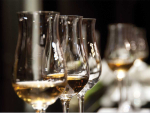Next Generation Viticulture: Capture more light to harvest more grapes
Transforming canopy management systems to maximise sunlight could increase vineyard profitability without compromising wine quality, says researchers.
New Zealand's wine industry is “severely lacking in any diversity”, says the head of a research programme working to secure a repository of grapevine genetics, including disease resistant vines.
One aspect of Bragato Research Institute’s (BRI) Grapevine Improvement Programme is developing new clones of Sauvignon Blanc with diverse traits, with plans for a collection of 12,000 unique vines to reduce risk and grow quality. But programme leader Dr Darrell Lizamore says importing disease resistant vines (DRV) from Europe is another important piece of the puzzle, giving growers the opportunity to plant new varieties bred from contemporary and disease resistant parent stock, such as wild American vines that evolved alongside the powdery and downy mildew pathogens.
After several generations of breeding, the vast majority of traits in a DRV come from the commercial variety, while a small but important portion hails from the wild parent. Historically the success of the breeding would be tested with mature plants in the field, but modern DNA testing allows for marker-assisted selection, enabling a faster process to develop varieties with commercially desired attributes and natural disease resistance.
Darrell notes that winegrowers in Champagne and Bordeaux are already tapping into the advantages of DRVs to reduce their reliance on sprays and address challenges of climate change. “DRVs offer a proactive approach to mitigate these risks.” Comparing that growing appetite to the more muted response in New Zealand, he says the focus on eradicating sprays in Europe has made DRVs more of an “existential question” there. “This is one of the really promising options for them. I don’t think many New Zealand winemakers are thinking that way yet.”
BRI is working with overseas developers of DRVs, looking beyond varieties they think will perform “very well in New Zealand”, to seek a wider range of genetic traits. Darrell explains that their performance here will depend on other factors, including the strain of the pathogens, so something that performs well in France’s Loire Valley may be less successful in Marlborough. “We want to bring as diverse a population of DRVs into New Zealand as possible, so we can assess the various resistance genes locally,” he says, noting a dual goal of applying less chemicals while yielding high quality wines.
Cloudy Bay’s parent company Moët Hennessy is already trialling DRVs in Champagne, says Cloudy Bay Technical and Sustainable Development Director Jim White. “I think that’s a really good indication of the acceptance of these varieties.” Grapegrowers around the world, including New Zealand, are “locked into a growing system” that requires constant spraying for protection against powdery and downy mildew, and he sees a lot of potential in DRVs. “I expect this will be part of a varietal revolution in coming years.”
After finding several European examples he thought could be good options for New Zealand, Jim poured a selection of wines for a panel of winemakers, researchers and nursery experts in Marlborough earlier this year. He knew there’d be some doubt amongst the tasters, based on the bad reputation forged by early examples of hybrid wines, which had “foxy” characters from the American parent material. But nearly a century after the first releases, the “very good” wines he chose are akin in character to Marlborough Sauvignon Blanc, while “the need for spraying is massively minimised or you don’t need to spray at all”.
C loudy Bay has been liaising with Riversun Nursery, which already has some DRV in quarantine in New Zealand. “In reality we won’t have the opportunity to make any wines beyond a trial scale until 2030 or maybe 2032,” Jim says. “But we see huge potential in disease resistant varieties.”

Over the past three years or so, the New Zealand Winegrowers Board has consulted with members on proposals to reform…

OPINION: New Zealand is the "last great bastion standing" when it comes to wine imports to the United States, wine-business…
The large 2025 harvest will exacerbate the wine industry's "lingering" supply from recent vintages, New Zealand Winegrowers Chief Executive Philip…
If you find a new consumer in a developed wine market, you are taking them from someone else, says Blank…
With the stars of Matariki to rise in June, Jeff Sinnott, a member of the Tuku Māori Winemakers Collective, looks at…